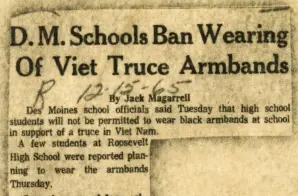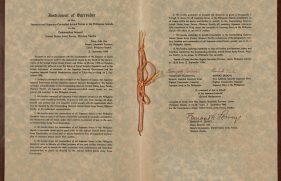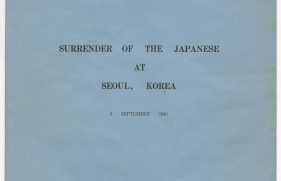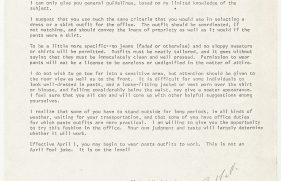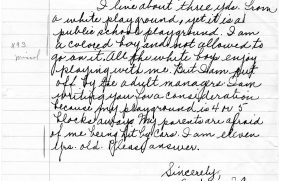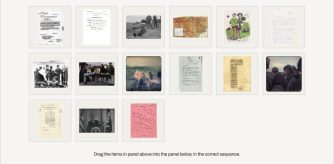This article from The Des Moines Register was entered as defendants’ Exhibit 2 in John F. Tinker et. al. v. The Des Moines Independent Community School District et. al. It describes the decision of Des Moines, Iowa, school officials to ban students from wearing black armbands to school in support of a Vietnam War truce.
A group of junior high and high school students had decided to wear black arm bands from December 16th until New Year’s Day to peacefully express their “grief over the deaths of soldiers and civilians in Vietnam.”
On December 14, Des Moines School District principals met and enacted a rule that “any student wearing an arm band would be asked to remove the arm band, and if he refused he would be suspended until he returned without the arm band.” The policy was announced to all students on December 15 as well as reported in this newspaper article. (A version of the policy typed up on December 23 was entered as Exhibit 3 in the court case.)
With assistance from the American Civil Liberties Union (ACLU), the Tinker and Eckhardt families filed a complaint against the school district for violation of the right to free speech under the First Amendment, and further that First Amendment rights are protected from state infringement (such as a public school board) under the due process clause in the Fourteenth Amendment.
The Tinkers and Eckhardts testified that their purpose for wearing the arm bands was to mourn those who died in the Vietnam War and to support Senator Robert Kennedy’s proposal that the truce proposed for Christmas Day 1965 be indefinitely extended.
The U.S. District Court dismissed the case, agreeing with the school district’s actions, based on their claim that the arm bands would have caused a disruption at the school. After the U.S. Court of Appeals for the 8th Circuit split evenly over the decision, thus upholding the District Court decision by default, the Tinkers and Eckhardts appealed their case to the Supreme Court.
In the landmark 1969 Tinker v. Des Moines decision, the Supreme Court ruled in favor of the plaintiffs, the Tinkers and Eckhardts. In the opinion, written by Supreme Court Justice Abe Fortas, the Court stated “[The wearing of arm bands] was closely akin to ‘pure speech’ which, we have repeatedly held, is entitled to comprehensive protection under the First Amendment.” Further, “It can hardly be argued that either students or teachers shed their constitutional rights to freedom of speech or expression at the schoolhouse gate,” Justice Fortas wrote for the majority.
